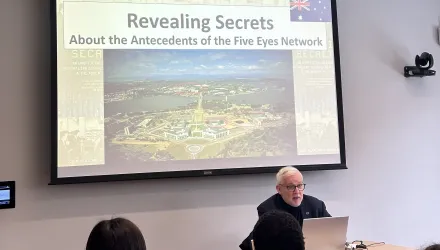Why George Bush?
That's the question Democrats, including myself, were asking themselves as he took his second oath of office yesterday.
This time he won it fair and square in spite of the fact that, if three recent national polls are to be believed, no one thinks he's doing a particularly good job at the big issues in front of the country — especially Iraq. So why was he putting his hand on the Bible yesterday, instead of John Kerry?
The answer can be found in the inaugural address itself. It was short, it was to the point and it had one — only one — big idea in it. As the speech moved on toward its conclusion, you waited to hear Mel Gibson as the 13th century hero William Wallace in the movie "Braveheart" emitting one last blood curdling cry —"Freeeeeedom!"
Bush stumbled into the presidency during the largest single event in recent American history since the bombing of Pearl Harbor — the attacks on 9/11. Those attacks took what was shaping up to be an aimless and uninspired presidency and turned it into a presidency with a purpose — to protect America by spreading liberty to other lands. His message to revolutionaries around the world — "Democratic reformers facing repression, prison or exile can know: America sees you for who you are: the future leaders of your free country" — is breathtaking for its idealism, ambition and commitment to place America, once again, in the middle of internal struggles in far away lands.
The sheer power and simplicity of this message — not so different from the message Bush gave with admirable consistency throughout the campaign — stands in stark contrast to the muddle that is the Democratic Party's view of America in the world. In some ways this is not the fault of the Democrats. Bush himself explained it: "After the shipwreck of communism came years of relative quiet, years of repose, years of sabbatical — and then there came a day of fire." Democrats governed during most of those years of sabbatical and when the world changed they were out of power. At the very moment in time when Al Gore had planned to re-start the fight for the presidency that many believed he had rightly won, his only option was to say, "George Bush is my Commander in Chief."
But while that sentiment was right in the fall of 2001, the post-9/11 unity lasted way too long for the Democrats' own good. By the fall of 2002, Kerry, many of his fellow Democratic senators and many of the party's own foreign policy elite followed Bush into Iraq, tempering their support with vague exhortations to involve our allies. When that war started to go badly, due in part to mistakes on the part of the Bush team, Democrats sounded like a bunch of Monday morning quarterbacks. What no one sounded like was The Quarterback. That was left to Bush.
The Democratic opportunity lies in the fact that the Bush vision is very likely to fall apart. It calls for a level of involvement in the world that is akin to that at the height of the Cold War, where we inserted ourselves in countries around the world to keep them out of the Soviet sphere. This level of involvement requires a level of mobilization that the Bush team is reluctant to commit to. It means lots of spies, lots of troops, lots of taxpayer dollars. It's inconsistent with permanent tax cuts and taking money out of Social Security for private accounts.
Democrats can start countering Bush by becoming a true opposition party and shedding the image of accomodationism that they earned in Bush's first term. There are hopeful signs on the horizon — they showed some spunk in holding up Condi Rice's nomination as Secretary of State, and the consultants who drove the party off the brink are slinking into retirement one step ahead of an angry mob of Democratic fund-raisers.
But in spite of these hopeful signs, Democrats won't get back in the game until they too can weave a vision of the world that is realistic and consistent with American values — all in less than 20 minutes.
Elaine Kamarck, a lecturer at the John F. Kennedy School of Government at Harvard University, served in the Clinton-Gore administration.
Kamarck, Elaine. “What's The Lesson Here for the Dems?.” Newsday, January 21, 2005





